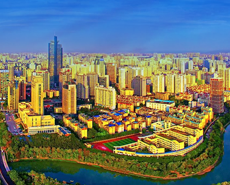
Chinese ferronickel industry to accelerate capacity transfer abroad in 2021
----Interview with Liang Zhang
General Manager
Zhejiang Fuwei Energy Technology Co., Ltd.
General Manager
Zhejiang Fuwei Energy Technology Co., Ltd.
Zhejiang Fuwei Energy Technology Co., Ltd. acts as a producer and service provider dedicated to providing nickel-based materials for metallurgical equipment manufacturing industry. Based on the current development of the industry, the company actively seeks alternative raw materials and takes the road of sustainable development, continuously carries out technical upgrade and process improvement, and produces low-phosphorus, low-sulfur, low-chromium and titanium-free ferronickel alloy with renewable raw materials through the research and development with care and attention. At present, it is one of the main suppliers of the equipment materials supply chain for major steel plants in China, and one of the few producers in China who supply nickel-based materials.
Asian Metal: Could you please introduce your company to us, Mr. Zhang?
Mr. Zhang: Zhejiang Fuwei Energy Technology Co., Ltd., established in 2016, was initially engaged in the R&D and production of nickel-based materials for new energy batteries. However, with the ever-changing market demand and fierce competition, we decided to switch to ferronickel production in 2017 after repositioning our corporate mission and further discussing long-term development goals. At present, we mainly supply nickel-based alloys required for metallurgical equipment production. The company began to launch commercial production of ferronickel in 2018 and achieved large-scale production in September 2020. It owns an annual production capacity of 24,000t of ferronickel currently, and the output value reached RMB17 million (USD2.60 million) in 2020.


Asian Metal: What are the main downstream customers of your company?
Mr. Zhang: Our direct customers are metallurgical equipment manufacturing companies that produce equipment for steel mills, including well-known domestic steel companies such as Wuhan Iron and Steel, TISCO, Anyang Iron and Steel, Sinosteel, and so on. Our products are featured with low phosphorus (P≦0.02), low sulfur (S≦0.02), low chromium (Cr≦0.005) and titanium free, containing 3.8%-5.5% nickel. At present, our company produces around 2,000t of ferronickel per month, which can meet the need of a quarter of domestic customers.
Asian Metal: How do you run your business in shortage of imported nickel ore amid fierce competition among ferronickel plants in China?
Mr. Zhang: Domestic ferronickel plants have faced raw materials shortage since 2018; especially after January 1, 2020, China's imported nickel ore volume declined by 50% as its main lateritic nickel ore supplier, Indonesia, suspended the export of the raw material, which meant that most domestic ferronickel plants would have no access to raw materials. In response to this situation, we conduct technical upgrade and process R&D. At present, 95% of our raw materials are recycled materials, including but not limited to nickel-containing wastes from steel mills and other ferronickel plants. Thus, we can stay away from the competition of imported nickel ore, shorten the smelting time and greatly reduce energy consumption, and at the same time, increase the margin. At present, our production cost of recycled materials is about 40% lower than that of lateritic nickel ore.


Asian Metal: Do you think that current recycled materials throughout China can meet the market demand?
Mr. Zhang: At present, few domestic companies master the production technology of recycled materials. In the short term, the supply of these materials can meet the demand, but we expect a supply gap two years later. Currently, 35% of the scraps we use come from steel mills, 60% from ferronickel plants, and the remaining 5% from ferronickel-related companies. As domestic ferronickel plants switch to production of other products or move abroad, we expect that 30% of China's ferronickel plants would disappear within two years. The traditional ferronickel plant belongs to low-end industry in the stainless steel field, and it is an inevitable trend for the plants to shift their production or move abroad because of high pollution and low efficiency.
Asian Metal: What's your opinion about the fact that domestic ferronickel plants move abroad or switch to production of other products?
Mr. Zhang: After Indonesia suspended the export of lateritic nickel ore at the beginning of 2020, domestic ferronickel plants shut down or switched production rapidly. Some powerful plants went to Indonesia to build factories and transfer their production capacity abroad. Based on this fact, we must take precautions. First, we prepare to import scraps, actively contacting foreign suppliers of recycled materials, and carry out rough processing of scraps abroad and then import them into China. Second, we adjust the formula, adding other alloys, reducing the proportion of scraps from ferronickel plants and increasing that from steel mills. Third, we make process innovation, adjust production processes to meet the national carbon emission requirements, and also alleviate the impact of raw materials shortage.

















